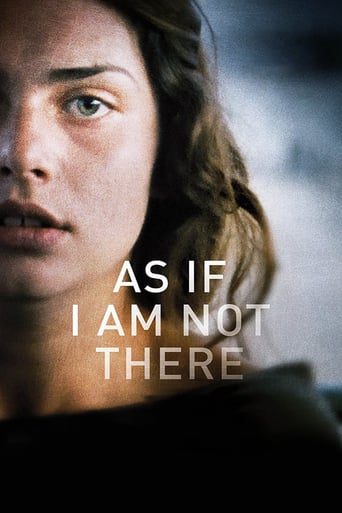
A harsh dose of cinematic realism about a harsh time – the Bosnian War of the 1990s – Juanita Wilson's drama is taken from true stories revealed during the International Criminal Tribunal in The Hague. Samira is a modern schoolteacher in Sarajevo who takes a job in a small country village just as the war is beginning to ramp up. When Serbian soldiers overrun the village, shoot the men and keep the women as laborers (the older ones) and sex objects (the younger ones), Samira is subjected to the basest form of treatment imaginable.
Similar titles










Reviews
Sorry, this movie sucks
So much average
Plenty to Like, Plenty to Dislike
I cannot think of one single thing that I would change about this film. The acting is incomparable, the directing deft, and the writing poignantly brilliant.
Samira is a young teacher from Sarajevo who takes a teaching job in a small village .Serbian soldiers take them all even though she explains she is only there to teach,this comes to no avail she is herded like other women to a camp ,she is in a state of shock having witnessed mass shootings. Her dignity as a human and a woman is torn to pieces. Watching/feeling the aftermath of the torture to herself, of the other women and one very young girl whos rapist/torturer knew her brother..gross!!She decides not to die silent..but to use her femininity to get a "somewhat" easier existence. She gets noticed by the Captain and becomes his main girl. Which is quite disturbing also because he doesn't torture or threaten her but gives her the simple things like food,access to a bath.... the small things we take granted become like a currency. (I am forced to ask myself if i would do this under the same conditions.And the answer is probably yes after being raped and beaten any respite would be welcome).He knows she hates him/fears him which still make him a raper, but he doesn't want to force her like the others...This leads to a complicated situation with the other girls who are experiencing the hell of the other soldiers.A very dark look at humans in general..Serbian men in this particular case since they all grew up along side these women maybe even went to the same schools somehow making it worse for me to understand.Anyway she survives but what is left is a shell of her former self.Its very sad to think of these ladies having to go through such horrors and the men thinking they can get away with it.But the strong acting makes it into a compelling film, even though extremely disturbing .
While it is at times extremely troubling to watch, As If I Am Not There is a startlingly realistic depiction of the Bosnian War. From scenes of whole villages being rounded up and the men murdered, to women being raped and brutalized by soldiers in secluded camps, this movie does an excellent job of representing the types of depravity that took place in the early 1990s. Wilson does not base Samira's story on a specific case, but uses her character to represent an amalgamation of testimonies from survivors. In this way, the events of the movie are not necessarily a 100% accurate representation of a single person's experiences, but they include some of the terrible conditions and actions that these survivors had to endure. For instance, the practice of trading sexual acts for better treatment, food, or living conditions was not necessarily unheard of, but was a means of survival, not pleasure. In the film, Samira's relationship with the Captain causes the viewer to question Samira's moral involvement in the despicable treatment of her fellow inmates. In a similar way, Samira's seemingly compliant attitude and lack of opposition to the Serb forces has drawn some criticism for the film. However, in a women's camp where Samira was kept separate from the majority of the other inmates, it is unlikely that this expectation of a rebellion or opposition would have been possible, and could have even led to greater harm. It is difficult to make moral decisions in situations like those portrayed in this film, and I appreciate this realism to a great extent. It is not flashy, or thrilling, but in this way, it avoids over-dramatization that often cheapens the message of similar movies. In addition to the relative accuracy of events, this film also makes an attempt to depict the complexity of the conflict. Throughout the movie, Wilson includes scenes that seem to humanize the Serbian soldiers, and show that these men were not just monsters, but men, friends of brothers, husbands, and fathers. This did not make me any more sympathetic toward their characters, but this effort hints to the multi-faceted nature of this conflict, and attempts to mitigate the antagonism placed on the Serbian army. During the conflict, Bosniak Muslims, Croats, and Serbians were all victims and aggressors, but the Bosnian War is often presented only as a story of Serbian aggressors committing terrifying atrocities against Bosnian Muslims. This perspective is a very significant piece of the history to recognize, but it is important to realize that it is far from black-and-white. Overall, this movie does a tremendous job with communicating this part of history in a powerfully realistic way, and I encourage anyone who is interested in watching it to do so.
This film, although extremely emotionally tolling and difficult to watch, is an important film depicting a women's internment camp during the Bosnian war. The main character, Samira, provides an accurate insight into the struggles facing women in these camps. These insights reach beyond our knowledge of the already terrible rapes and assaults that were so prominent, and give a look at the internal struggles facing these women and the effects of this treatment. The beginning of the film depicts the men being separated from the women, brought outside, and all shot to death. This is such a small, short scene in the film which demonstrated the normalcy of these murderous acts. It was't something the movie had to focus in on, it was clear what was happening and no questions had to be asked. The film then moves on to the main focus: Samira's experience in this dehumanizing camp. The film contains little dialogue, however dialogue is unneeded. Samira's facial expressions, body language and actions are enough to depict the pain and suffering she experiences throughout her time in the camp. In fact, the lack of dialogue is a smart choice on the part of Juanita Wilson because it allows the viewers to feel what Samira must have felt and allows them to throw themselves into her character more than if Samira had just described her feelings in words. It also demonstrates how women in these camps really were forced into silence following the things they had to endure. After the first rape, Samira could barely speak. She struggled to recover from this haunting experience and hid away in silence for a while until she realized that she was a human, not an animal as they saw her, and swore to grasp back onto her "womanhood" by putting on makeup and trying to look nice, something the other women disapproved of. This film also depicts the blurred line of morality in these camps. When Samira starts sleeping with the captain, there is a debate among the other women that she overhears. One says they would do the same thing while the other says it's a disgrace. Samira is doing what she thinks she has to do to survive, no matter how wrong it may be. The dynamic between Samira and the captain is obviously one where the captain has the upper hand. This is clearly still a case of rape because consent cannot exist in a camp such as this. Samira is aware of her lack of power in this situation and the captain is aware that Samira will do anything he tells her to do. The captain is portrayed in a way that could be seen as not completely evil, however the fact that he takes advantage of his power in this way makes him just as bad as any other rapist in that camp. The ending to the movie is another smart choice by Juanita Wilson because it shows that the suffering goes beyond liberation from the camp. Samira will forever see the pain she went through when she looks at her child, and will forever be reminded of who the father was. There is no end to suffering no matter how physically free these survivors are.
Juanita Wilson depicts female experiences during the Bosnian War in her film As If I'm Not There. The main character, Samira, is a composite of women's ordeals in camps during the war. The film includes graphic depictions of rape, violence, and survival. Wilson made the choice to have minimal dialogue, which forces the audience to focus on dramatized light and sound. These sensory details in addition to Samira's sober facial expressions set the tone for each scene. Many of Samira's experiences reflect the experience of camp survivors. For instance, Samira's yearning for her pre-war life is depicted by her characterizing home as she soothes the dying schoolgirl who has been gang raped and brutalized for the last time to bed. Samira also asks the captain towards the end of the film if she gets to go home, as if her once home still exists. Another example is Samira's struggle to retain her identity. She claims she puts on makeup and dresses herself well because it's who she is. She also identifies as a teacher from Sarajevo to the Captain. The film also depicts camp life with a fair amount of accuracy. The temporary nature of camp circumstances leads to gossip and rumors. The interruption of childhood innocence is depicted by a schoolgirl being distracted by a butterfly. The schoolgirl claims it's not dangerous to her mother. The fragmentation of guards is portrayed through the captain who is manipulating and raping Samira, yet has an eight-year-old son. The inescapable nature of camp experience is symbolized by Samira accepting the child, who is the result of repeated rapes during her time in the camp.
Top Streaming Movies


















